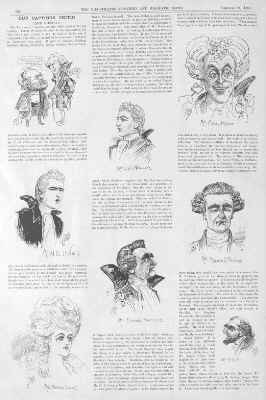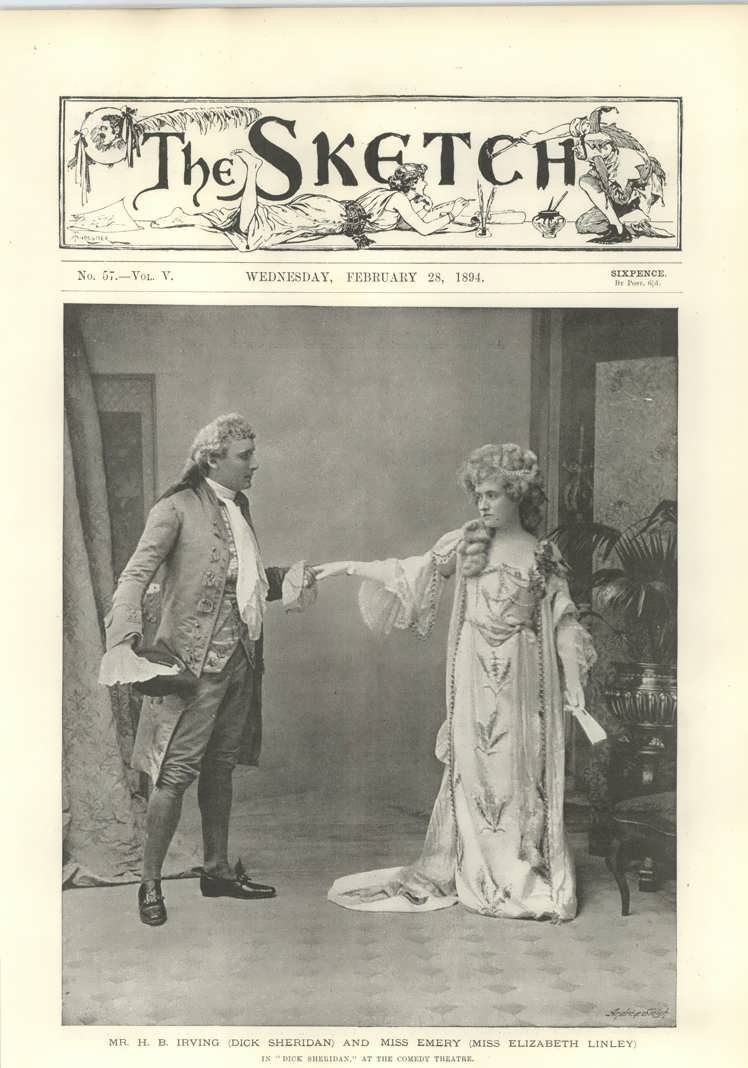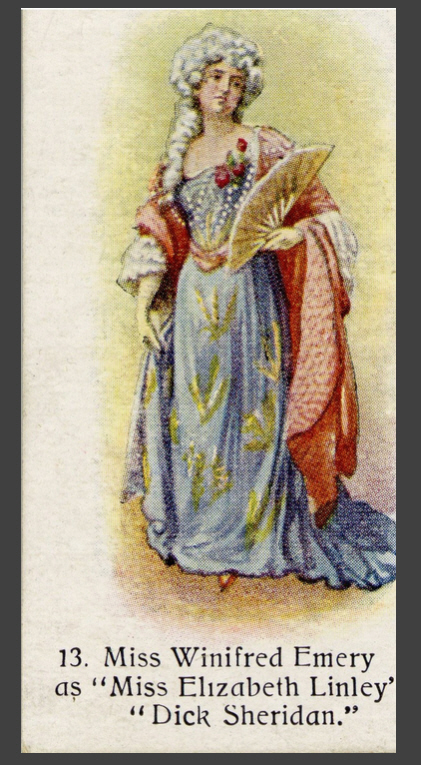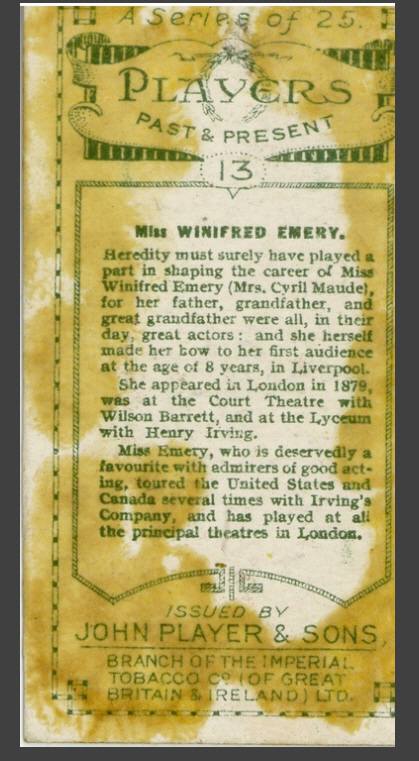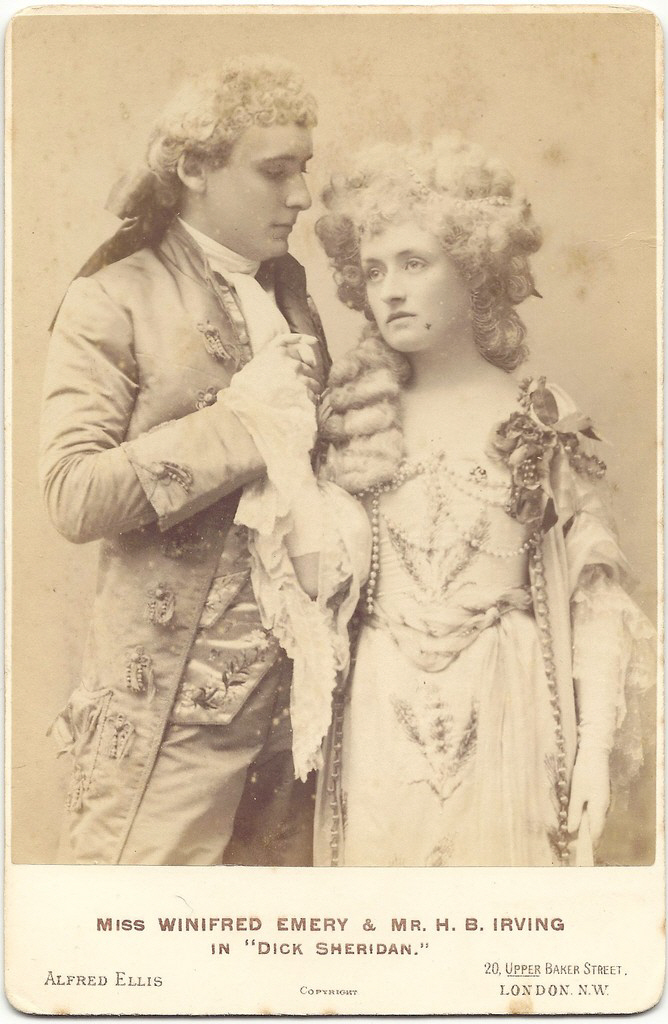|
|
 |
 |
|
ROBERT WILLIAMS BUCHANAN (1841 - 1901)
|
 |
 |
|
THEATRE REVIEWS
45. Dick Sheridan (1894) - continued
|
 |
 |
 |
 |
 |
|
 |
 |
 |
 |
|
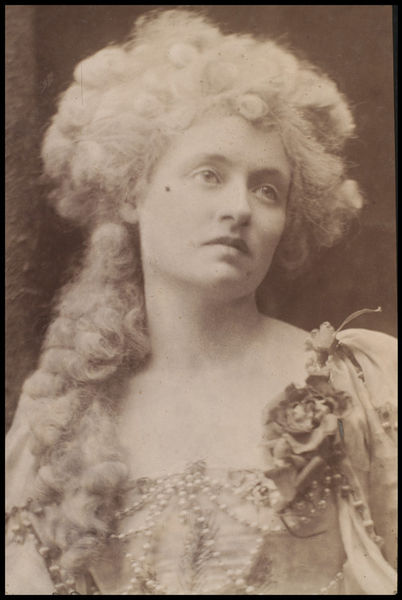 |
|
|
|
[Miss Winifred Emery as Miss Elizabeth Linley]
The Graphic (10 February, 1894)
“Dick Sheridan”
BY W. MOY THOMAS
MR. ROBERT BUCHANAN’S attempt to construct a comedy on the basis of the story of the elopement of Richard Brinsley Sheridan and Miss Linley, the “maid of Bath,” with all its familiar concomitants—the post-chaise, the hurried wedding in France, and the furious duel with Captain Matthews, the sinister and vindictive rival, at the tavern in Covent Garden, has been crowned with the rapturous approval of a first-night audience at the COMEDY Theatre. Nevertheless, Dick Sheridan has undoubtedly awakened in many quarters a feeling of disappointment; nor is the circumstance very difficult to explain. Dramatists who are courageous enough to select for their heroes historical personages are somewhat in the position of those professors of spiritualism who claim to have the power of putting us in communication with the illustrious dead. It is easy to evoke “raps,” but not always so easy to rap out something that will fulfil the auditor’s expectations. With the dramatist the difficulty is even greater, and it is one that threatens rather to increase than diminish, for with the popularisation of that marvellous triumph of science and art, the Phonograph, there must come a time when people will have become familiar even with the voices of the great folk of the past; and, unlike blind Isaac of old, will require something more than a goatskin glove to lead them to confound a Jacob with his brother Esau. Thanks to the arts of the dressing-room, faces may generally be made up with some regard to historical portraiture; but it is a harder matter to make a historical hero conform in other respects to preconceived notions. Sheridan is known to us all as a wit and a gay and dashing fellow. Witty and gay, therefore, he must be, or somebody will exclaim “That Sheridan? forsooth!” It is all very illogical, no doubt. As a fact, great wits are not in private uniformly witty, nor are gay dogs always gay. It is more than probable that at the period of Mr. Buchanan’s play, young Mr. Sheridan’s ambition to emulate the wit of Congreve was confined to his manuscripts, and that in the ordinary way he talked very much as other young men talk who are desperately in love and cruelly persecuted by fortune. Miss Linley, the popular songstress and famous beauty, was staunch and true, but there was plenty of reason forher lover’s anxieties. He was penniless, and the lady had a mercenary old father who, while he strove might and main to compel her to marry the doting millionaire, Mr. Long, actually stipulated for a thousand pounds for himself on the pretext that his daughter, being “apprenticed” to him, her marriage would involve the loss of her services. Even after the hasty wedding, and no less hasty separation, the prospects of the young couple were certainly dark enough to excuse Mr. Sheridan if he failed to realise our ideal of the brilliant author of The School for Scandal. A more substantial objection is that this biographical episode in its essentials is, like many other so-called “romances of real life,” a very commonplace affair after all, a mere story of Colombina, Arlecchino, and Panteleone dressed in the fine clothes of the belles and beaux of the Bath Assembly Rooms under the benignant reign of the great Nash’s successor, Mr. Wade.
What is really remarkable in Mr. Buchanan’s play is the way in which the author has contrived to make an intrinsically commonplace story entertaining. No doubt he was not under any obligation to take Miss Linley and her lover for his hero and heroine, but having done so, it is fair to say that he has used his materials with considerable skill. He has brought before us the gay picturesqueness of those times and, not without warrant or excuse, has introduced some new characters which are thoroughly acceptable and always amusing. A capital sketch is that of Dr. Jonathan O’Leary, the Irish scholar in reduced circumstances, who attaches himself to his old pupil Dick, and serves him with such unfailing fidelity and fertility of resource. The part is played by Mr. Brandon Thomas with a feeling for character, a humorous relish, and a ripe moderation which form a delightful combination. Approaching more closely to the confines of caricature, but still genuinely humorous both in conception and execution, is the Lord Dazzleton of Mr. Cyril Maude, who takes the place of Mr. Long in the legend; and eminently pleasing is the bright and sprightly soubrette, Mrs. Lappett, who finds quite an ideal representative in Miss Pattie Browne. A host of other minor characters serve to help on the action or diversify the scene. There are Mr. Sidney Brough’s Sir Harry Chase, Mr. Maurice’s Linley, Mr. Will Dennis’s David Garrick, Mr. Paget’s Wade, Miss Vane’s Lady Miller, Miss Lena Ashwell’s Lady Pamela—all pleasant sketches. The serious interest of the play, however, centres in Miss Linley, who, in the person of Miss Winifred Emery, clothed in lovely costumes of the time, involuntarily recalls to mind Burke’s famous exclamation regarding Marie Antoinette, and brings to the part all her womanly charm and emotional power. For the somewhat settled earnestness of Mr. H. B. Irving’s Sheridan I have already incidentally put in a plea. If the dramatist is justified in depicting his hero as no mere utterer of epigrams, but a “star-crossed lover” at war with fate, Mr. Irving cannot be blamed for playing the part in this vein. The fault of the performance, which certainly does not lack spirit or force, is a tendency to monotone which will doubtless soon correct itself.There remains only to be mentioned Mr. Lewis Waller, who, in the part of the designing roué, Captain Matthews, looks very handsome in his Georgian military uniform, and plays throughout with a grave and saturnine air which is decidedly impressive; but why, in the duel scene, when he has abjectly begged for his life, does he utter the words, “Is that enough?” with a sort of canine growl and bark? The play is put upon the stage very carefully—the scene of the Assembly Rooms at Bath, where the company in their brilliant costumes and uniforms dance to gavottes and minuets by Lully, Rameau, and Boccherini, being particularly noticeable.
___
The Penny Illustrated Paper (10 February, 1894 - p.90)
MUSIC AND THE DRAMA.
_____
“Dick Sheridan,” at the Comedy.
IT was an exceedingly happy thought of Mr. Robert Buchanan to write a comedy of which the hero should be the brilliant and witty author of “The Rivals” and “The School for Scandal”; and right lucky was this singularly versatile and talented Victorian man-of-letters to induce so remarkably tasteful a manager as Mr. J. Comyns Carr to produce this charming play so vividly that the belles and beaux of the past century live again for the enjoyment of playgoers of to- day. That “Dick Sheridan” was highly appreciated by the audience that filled the Comedy Theatre last Saturday night was placed beyond a doubt by the enthusiastic reception accorded to the clever company and to the piece. Opening at the Bath Assembly Rooms at the period when it was the custom for the fashionable world to gather there for flirtation and pleasure, the new comedy starts well with the assiduous courting of the beautiful Miss Linley by the foppish old beau, Lord Dazzleton, by the cold-blooded roué, Captain Matthews, and by her favoured lover, young Richard Brinsley Sheridan, who saves her from the persecution of his rivals by eloping with his sweetheart to France. The minuet and gavotte of olden times (deftly arranged by Mr. John D’Auban), and all the formal and artificial gallantry of the period, when men wore silken coats and hose and periwigs, and ladies powdered their hair and looked none the less lovely for it, are faithfully recalled; and it is but just to compliment “Karl” and Mrs. Comyns Carr on the accuracy with which they designed the elegant costumes. The ladies will be enchanted with “Dick Sheridan,” by reason of the superb beauty of these costumes, made by Messrs. L. and H. Nathan and Mrs. Nettleship; and because of the adroit way in which the course of true love, running adversely at first for the constant couple, leads to a happy ending at last, when Dick Sheridan has worsted his most determined enemy, Captain Matthews, in a duel, and won renown as a dramatist. From this rapid summary it will be gleaned that “Dick Sheridan” is full of interest. But the play must be seen to appreciate the wealth of characterisation with which it is embellished. As the sweetly captivating Elizabeth Linley, Miss Winifred Emery, is perfect in her simplicity, in her fidelity to her true love, in her winsome presence. And a very manly and sympathetic Dick Sheridan did I find Mr. Irving’s son, Mr. H. B. Irving, who will, when the first-night’s nervousness has worn off, no doubt infuse that vivacity and gaiety into his acting that the part needs. One of the most attractive characters is the good-natured Irish friend and follower of Dick, Dr. Jonathan O’Leary, very genially played by Mr. Brandon Thomas. The kindhearted old fop of Mr. Cyril Maude is another good study by this sterling young actor of the artificial beau of George the Third’s reign. The inflexible scheming of Captain Matthews suits the style of Mr. Lewis Waller to a nicety. Notable bits of good character-delineation are also supplied by Miss Vane as “The Queen of Bath,” by Miss Pattie Browne as Mrs. Lappet, by Miss Lena Ashwell as Lady Pamela Stirrup, by Mr. Will Dennis as David Garrick (a capital make-up), and by Mr. Sydney Brough, Mr. Edmund Maurice, Mr. F. M. Paget, and Mr. John Byron. The musical accompaniments and entr’acte selections of Mr. A. J. Caldicott’s orchestra, and the scenery by Mr. Walter Hann, were worthy the piece, the close of which was the signal for hearty calls for all concerned in its successful production.
___
The Illustrated London News (10 February, 1894 - p.3)
THE PLAYHOUSES.
BY CLEMENT SCOTT.
At this time of the year we surely need to be brightened up a bit. Nature lacks colour, and art should supply the deficiency. The Carnival, or as much as we see of it in England, is over, and Lenten penance takes its place. The insistent gloom seems to have affected the playmakers and the players. Little did I expect to see in the course of a few hours a gloomy Richard Brinsley Sheridan and an artificial Polly Eccles! I have always associated the famous Irishman, dramatist and orator, with the gayest of his own creations. He must have been as reckless and extravagant as Charles Surface, beloved by women, prodigal to his friends, mercifully treated by moneylenders, and idolised by “Little Premium.” Dick Sheridan may have been an unregenerate Bohemian, but he was surely never a bore. Mr. Robert Buchanan confesses that he has carefully studied the bons-mots of one who was once called a wit, and finds his humour somewhat strained. Such men, of course, have their moods. They must be melancholy as well as merry. The night’s revelry is paid out by the morning’s depression; still, for all that, it is a new view of Sheridan to see him so persistently lachrymose. The Bath romance in the early life of the young dramatist, when he ran away with the beautiful Miss Elizabeth Linley, in a fit of platonic devotion, to save her from the love of his own brother and the snares of Captain Matthews, and subsequently married her, makes, no doubt, a capital subject for a play. But if it was to be corrected or amended for the stage it would have been better, I think, to have emphasised the chivalrous side of the hero’s nature instead of making him the victim of a relentless fate. However, the play as it stands gave Mr. Comyns Carr an opportunity of showing us beautiful and accurate pictures of the Sheridan period, when men dressed as smartly as the women did, when lovely faces were transferred to the canvas of Sir Joshua, and when Bath was the centre of society and scandal. If anyone wants to see the eighteenth century in action, an early visit should be paid to the Comedy Theatre, where we can see in Miss Winifred Emery a typical beauty, in Miss Vane a handsome intriguing dowager, in Mr. Lewis Waller a comely officer gorgeously attired in the old English uniform of the Guards, in Mr. Cyril Maude a fop and exquisite of the first water, in Mr. Brandon Thomas a delightful Irishman, half tutor, half servant, to a generous young master, and in Mr. H. B. Irving a new but not wholly uninteresting Sheridan. The acting of all these characters is not only creditable, but of the first class. It may be a strange fancy to enlist our sympathies for Captain Matthews instead of honest Dick Sheridan, but so it is. Mr. Lewis Waller gains in exact proportion as Mr. H. B. Irving loses. It is not the fault of the gallant Captain that he seems to get the mastery over the poor perplexed poet and dramatist. The dramatist has so told the story that the soldier scores continually off the author. Firm and defiant is the one; weak and vacillating is the other. It would not be in human nature to award our sympathies otherwise; in fact, it is a matter of surprise that the beautiful Bessie does not put herself under the protection of the man who planned the elopement instead of the sentimentalist who frustrated it. It is thus early in the play that a false, and, as I hold, an unnecessary, note of depreciation against Sheridan is struck. I cannot find in Moore, or in Mrs. Oliphant’s monograph, or in Mr. Percy Fitzgerald’s interesting volumes, in which he assuredly does not favour Sheridan, one word to show that the elopement at Bath was planned by Matthews and taken advantage of by Sheridan. Quite the contrary. Sheridan did it all, and enlisted women into his confidence in order to foil Matthews at every turn. The wonder was how such a youth could have found the money to carry out an enterprise that involved a posting journey from Bath to London, a halt in the city, a journey overs seas to Dunkirk, and endless expenses until Miss Bess was safely housed in a convent. All these details belong to romance. We admire the hero who can platonically go through such anxiety. But when Mr. Buchanan tells us that the Captain arranged the elopement, ordered the carriages, planned the campaign, and probably paid for it in advance, while Sheridan sneaked in at the last moment and whisked away the prize—why, then our sympathies with Sheridan are reduced to freezing-point.
___
The Illustrated Sporting and Dramatic News (10 February, 1894 - p.22)
COMEDY THEATRE.
Dick Sheridan, the new piece by Mr. Robert Buchanan produced at the Comedy Theatre, is not a work which will do much for the literary or artistic reputation of its author, though it possesses many sound dramatic qualities and seems from its reception on Saturday night to have all the elements of a popular success. As a comedy of eighteenth century life it lacks style and finish; as a melodramatic romance it has so much animation and brightness in individual passages that its want of symmetry and balance as a whole is fairly atoned for in the eyes of the not too exacting spectator. Add to these intrinsic merits the advantages of extremely spirited interpretation and of singularly rich and harmonious stage attire, and it will be easily understood that Dick Sheridan, whilst missing the appreciation of the critical few, may well command the interest and provide the entertainment of the general body of playgoers.
In a footnote to the programme Mr. Buchanan explains that though his play has no pretension to historical accuracy in matters of detail it is based upon actual incidents in the life of the author of The School for Scandal. These incidents are, of course, young Sheridan’s elopement with the beautiful songstress of Bath, Miss Elizabeth Linley, his secret marriage with her in France, his remarkable duel fought with Captain Matthews in a room, and his subsequent establishment of his position through the ultimate success of his first work, The Rivals, after its first-night failure. beyond this in the extraordinary career of its hero the play does not go, and in its happy climax there is no indication of the clouds which were to overshadow the brilliant life before its close. Nevertheless it is, on the whole, with the graver aspects of the young man’s character that the drama is chiefly concerned. The attempt to introduce to us Sheridan the wit, paying off the scores of his creditors with a cynical jest is a dismal failure, since humour is not Mr. Buchanan’s strong point any more than is subtlety of characterisation. If it were not for the name which he has bestowed upon his hero, we should never guess that this personage could be the author of some of the wittiest comedies in the language, and we should merely regard him as the passionate young gallant of a bygone day, alternating earnest rhapsody with reckless adventure. Mr. Buchanan, in fact, with all his eye for picturesque incident, and telling situation has missed the creative inspiration demanded for what we may call the personal element of his self-imposed task. His Dick is obviously Sheridan only in name and is merely the reproduction of a stage type as familiar and conventional as the effete beau Lord Dazzleton, the scholar-servitor O’Leary, the heavy father Mr. Linley, and the intriguing soubrette Mrs. Lappet. The first act of the play sets forth with much animation, though at far too great a length, the position of affairs when Captain Matthews, Lord Dazzleton and Dick are all rivals for the favour of the belle of the Assembly Rooms at Bath. In her anxiety to escape from the old nobleman’s condescending offer of marriage Miss Linley nearly falls a prey to the less honourable designs of Matthews, from which she is saved by an effective coup de théâtre on the part of Sheridan. The second act begins badly with the scene of abortive comedy already referred to, but it winds up with a pretty interview between Sheridan and his secretly-married bride, who brings him news of the acceptance of The Rivals at Covent Garden. Act III. occupies itself spiritedly enough, if none too plausibly, with the knavery on the part of Matthews, whereby the first-night failure of The Rivals is secured, notwithstanding the change of front on the part of the influential Lord Dazzleton, which is brought about by Elizabeth’s appeal on behalf of the husband who is supposed to be only her lover. The alternations of the young couple between hope and despair are well imagined and showily illustrated; and the vengeful malice of Matthews culminates in the threat to lodge his unhappy rival in the King’s Bench Prison as a hopeless bankrupt. At the beginning of the last act it is soon discovered that through the kindly offices of Miss Linley’s reformed patron, Lord Dazzleton, his more pressing debts have been paid, whilst there is every probability that the second representation of The Rivals will atone for the failure of the first. The young playwright is however still in deep and not very characteristic despondency about his future, and he almost hopes when he is challenged by Matthews that the result of his duel may be to free his newly-married wife from her unprofitable husband. But of course it is Dick who comes off victorious, and equally of course his triumph in arms is speedily followed by tidings of his triumph on the stage. It is all rather obvious in development and rather commonplace in conception; and it suggests the aims and methods, let us say, of the Adelphi or the Vaudeville rather than those of the Haymarket and the St. James’s. Its breezy vigour however, and its broad picturesqueness provide the representatives of its dramatic personæ with opportunities of the recognised order which can hardly be said to have become ineffective in their familiarity. One seems for example to have met over and over again upon the stage with a doddering old buck of the stamp of Lord Dazzleton with his fund of genuine good nature underlying his veneer of conceited affectation. Yet is Mr. Cyril Maude able to endow the trite study with new vitality, making his only mistake in the exaggeration of the tripping exits in which the aged nobleman indulges when he is specially pleased with himself or his doings. So again, although there is no particular individuality about the frank lovable nature of Elizabeth Linley, the emotional and declamatory power of Miss Winifred Emery, who looks simply bewitching in her old-world coiffure and attire, succeeds in giving her a really interesting personality. The firm touch of that remarkably versatile comedian Mr. Brandon Thomas gives a life-like air to the highly coloured sketch of Dr. John O’Leary, scholar, sheriff’s officer and devoted servant, whilst Miss Vane and Mr. Lewis Waller can get much melodramatic force out of the jealous wiles of Lady Miller and Captain Matthews. Dick Sheridan is indeed unusually well acted all round; and in auxiliary rôles, Mr. W. Dennis is inoffensive if rather weak as the great David Garrick, Mr. Sydney Brough and Miss Lena Ashwell make of Sir Henry Chase and Lady Pamela a very likely pair of Bath fashionables, Mr. Maurice is a duly ponderous father of the “heavy” order, and Miss Pattie Browne distinguishes herself by a bright rendering of the flirtations of a soubrette. It was, however, upon none of these that the chief criticism of Saturday night was concentrated, but on the Dick Sheridan of Mr. H. B. Irving, upon whose comparatively inexperienced efforts in the title-rôle it was felt that the outcome of the venture must largely depend. Small wonder that the young actor was nervous, or that he occasionally missed the execution of his own excellent intentions. But he got through his heavy task with more than average credit, and he will get through it better still in a few nights to come. The sincerity of his love-making, the fire of his passion, and the quiet humour of his comedy are all of the highest promise. He must try to be a little less monotonous in his expression of distress: he must give up the habit of standing with both knees bent, and he must strive to secure the grace in repose which he often attains in action. But the improvement which he here makes upon his work in A Fool’s Paradise is as marked as it is hopeful; and his Dick is worth seeing for its promise of the future, as well as for its fulfilment of the present. The production is mounted in the most perfect taste, and the dresses designed by Mr. Comyns Carr’s wife for the occasion are some of the best, both in individual form and in general scheme of colour, which have ever graced a parallel series of stage pictures. Whether the piece itself is practically worthy either of its admirable interpretation or of its finished decoration time alone can show.
___
The Colonies and India (10 February, 1894 - p.27)
“Dick Sheridan,” at the Comedy, is a new proof of Mr. Robert Buchanan’s versatility. Few dramatists can boast two plays so opposite in character as “The Charlatan,” at the Haymarket, and “Dick Sheridan,” both running at the same time, and both a success. Between the dark hypnotic Eurasian and the brilliant Sheridan there is a wide gulf, and little or no trace of the same hand. Mr. Henry Irving’s eldest son has come back to the stage again to impersonate the witty, thriftless, bankrupt playwright, and does it well, although on the first night he wore a somewhat gloomy air. But that possibly is Mr. Buchanan’s fault, for the Sheridan at the Comedy is hardly the dashing fellow who delighted in elopements, duels, and other adventures of a similarly exciting nature. Nevertheless, the play is interesting. It brings old Bath and its quaint picturesque scenes to Panton Street, and Mr. Brandon Thomas, Mr. Cyril Maude, Mr. Lewis Waller, Mr. Sydney Brough, Miss Lena Ashwell, and Miss Winifred Emery ably reflect the spirit and manners of the age, and wear their last-century clothes with becoming grace.
___
Hampshire Telegraph and Sussex Chronicle (10 February, 1894)
OUR LADIES’ LETTER.
_____
. . .
“Dick Sheridan.”
The first night of the new play “Dick Sheridan,” at the Comedy Theatre, saw the usual interesting audience assembled. Actors and actresses, dramatists, novelists, literary and social lights foregathered as usual in the private boxes and the stalls. The play is put upon the stage with that artistic correctness of detail which may be expected from such an authority on these matters as Mr. Comyns Carr. His clever wife helped in designing the dresses, which in many cases reach a high standard of beauty. As a detail of the stage management, we may remark that the Assembly-rooms at Bath are lighted by, apparently, the wax candles which were the only fashionable illuminant in those days. Those at the Comedy Theatre are imitations, and while exactly resembling candles, serve to convey the electric light to what appears to be the wick at the top. The gavotte in the first act, and the duel in the last, will appeal to many on whom the more subtle points of plays are often lost. Dick Sheridan is certainly disappointing, though not by any means in the personality of the actor, for Mr. H. B. Irving is remarkably handsome and distinguished-looking, with perfect elocution and a graceful presence. He resembles his father, Mr. Henry Irving, very strongly, especially about the mouth and in the way he acts with his hands. But the Sheridan of our imagination, with his warm heart, his flow of fun, his thriftlessness and enthusiasms, has to disappear before Mr. Robert Buchanan’s conception of the character. He might in the present play be any clever young man of fashion; and, to our thinking, the interview with Mr. Abednego, in the second act, is not only very dull, but is totally lacking in the wit and sprightliness with which, as all the world knows, the real Sheridan was wont to cheat his clamorous creditors. Mr. Brandon Thomas as an Irishman, Mr. Cyril Maude as Lord Dazzleton, Mr. Lewis Waller as Captain Matthews, and beautiful Miss Winifred Emery as Miss Linley made the play. Their acting was absolutely perfect in every point, and Miss Emery’s dancing in the gavotte is well worth sitting out a very much duller play to see. She moves with exquisite grace, and the figure where the gentlemen cross their swords, and she leads the ladies with a dancing step between the two lines, is one that will remain in the memory of all who see it.
The Dresses.
Her dresses are all beautiful, but perhaps she never looked so well as she does in the first act, in a large powdered wig and a very pale blue satin gown, heavily trimmed with gold, and made with an overdress and Watteau of pale blue gauze, the fronts of which are bordered with gold. Miss Vane, as the Queen of Bath, wears dresses that are almost too magnificent for the ideas of the present day, but are thoroughly characteristic of the spirit of the times in which Sheridan lived, now a century and a-half ago. Her first dress is in orange satin, over an underdress of pale blue satin, covered with white silk muslin and bunches of violets. The bodice is in black velvet, much trimmed with gold. Another gown is in bright green satin, beautifully brocaded, the tone being as brilliant as that of the orange in the first dress.
The ladies in the audience treated the occasion with all the deference that can be conveyed in careful toilets. Mrs. Bancroft wore her favourite black. Near her sat Mrs. Jopling, in a black gown quite off the shoulders, but filled in on the top of the arms with a fine, semi-transparent beadwork, the upper edge of which disappeared under a narrow band of brown fur running right round the shoulders.
___
The People (11 February, 1894 - p.6)
COMEDY.
If the favourable reception afforded to Mr. Robert Buchanan’s play, brought out last week at Mr. Comyns Carr’s theatre, prove a trustworthy augury of its enduring success, writers for the stage need no longer cudgel their brains for unhackneyed plots or untried developments of character, or, indeed, for any character at all. All dramatists need to do is to take, as the author f “Dick Sheridan” has done, the familiar conventional types common to the footlights of the stage rather than inspired from their own headlights, and tack on to them the names of one or more celebrated personages of the past, who, by their own intrinsic excellence in art, literature, or politics, have become established public favourites. Without venturing to directly contravene so important a decision as that of a first night audience, and a brilliant one to boot, it will perhaps be best to let the quality of the new piece speak for itself through a condensation of its action. Richard Brinsley Sheridan, before he became known to fame as a dramatist (his position as politician being wholly ignored), meets in the Bath Assembly Rooms the beautiful Miss Elizabeth Linley, the music master’s daughter, to whom he avows the love for her he feels at first sight. The lady ardently reciprocates his passion, to the infinite disgust of young Sheridan’s two rivals, Cap. Matthews, a young libertine of sinister designs, and Lord Dazzleton, an elderly beau and fop, whose admiration for himself leaves him overcome with amazement when his proffered suit is firmly declined. The captain’s overtures, rejected by the lady with scorn since she has learned he is married, the two competitors plot to prevent their favoured rival, Sheridan, from winning Miss Linley’s hand. Persuaded by Matthews with unaccountable ease upon the slight pretext of a newspaper innuendo slighting upon her good name that her lover has written the slanderous paragraph in question, Miss Linley suddenly determines to escape at once from a harsh father and, as she concludes, a false and faithless lover, by flying to a cousin in France. And, strange to say, just after denouncing Matthews as the villain she knows him to be, the lady accepts his escort in her flight. The post chaise and relays of horses are prepared by the captain and his fellow-conspirator, a fact overheard by Sheridan’s faithful Irish man-servant, and of course, communicated to his master, who, carrying Miss Linley off from the Assembly-rooms’ ball, takes the place as well as the carriage of the libertine in the elopement. After that much is said but little done until the baffled Matthews fights a duel with Sheridan, in which he is worsted, and the old lord, suddenly converted by Miss Linley’s earnest appeal to his feelings from a selfish plotter into her chivalrous champion, causes the organised claque which caused Sheridan’s initial play, “The Rivals,” to be damned on the first night to secure its success by their applause on the next. With the success of Sheridan, both as dramatist and lover the play ends. Whatever future audiences may think about the play they can have but one opinion regarding the acting of it, to which much, if not most, of its favourable acceptation must be referred. Miss Winifred Emery as Elizabeth Linley looked as lovely as the lady was in real life, and acted the part with her wonted tenderness and grace. Sheridan was played by Mr. H. B. Irving, if with no definite expression of character, at any rate with such competence of speech and gesture as shows a great advance in his art since he was last seen as an actor. The part of an Irish serving man, upon terms of familiar intimacy with his master and fellow-countryman, Sheridan, was acted with quaint humour by that Proteus of the stage, Mr. Brandon Thomas. Mr. Lewis Waller gave a quietly effective rendering of the false captain’s insidiousness, and Mr. Cyril Maude was, of course, quite characteristic as the conventional old beau and fop of 130 years ago. Other parts were played by Mr. Sydney Brough, Mr. E. Maurice, the Misses Vane, Lena Ashwell, and Miss Pattie Browne. In a closing speech Mr. Comyns Carr, after thanking the audience for their “graceful” reception of the play, prophesied that the impersonator of its hero, Mr. H. B. Irving, would one day become a worthy rival of his father. Well, we shall see.
___
New-York Daily Tribune (11 February, 1894 - p.2)
Mr. Robert Buchanan has achieved a very considerable feat. He has contrived to present Richard Brinsley Sheridan to an English audience as dull, solemn, priggish and vulgar. The play called “Dick Sheridan,” which Mr. Comyns Carr has produced at the Comedy Theatre, is an even less successful dramatic effort than “The Charlatan” at the Haymarket, by the same author. It is, I believe, the same which Mr. Frohman wisely declined to bring out in New- York, preferring to pay a large forfeit to the writer. Mr. Carr has done what could be done for this melancholy piece, but his managerial skill is of little avail. The chief point of interest on the first night was the appearance of Mr. Henry Irving’s eldest son as Sheridan. The part gives him little chance, and he has, of course, little experience. But in his manner, appearance and evident intelligence there is abundant promise for the future.
G. W. S.
___
The Referee (11 February, 1894 - p.2
Over and over again I have protested against the practice of making speeches from the stage. I was prepared to look over Mr. Comyns Carr’s first offence, and purposely refrained last week from commenting upon the injudicious speech he made after the initial performance of poor “Dick Sheridan.” That a theatrical manager of such exceptional good taste as Mr. Carr should have made so egregious a mistake surprises me, and I don’t think it needed the wigging he has received in the newspapers, to say nothing of the rebuff from the gallery last Saturday night, to persuade him not to do it again. After all, it was done perhaps by way of kindness, for Mr. Carr, who told the critics that he was once one of themselves, may only have meant to help them out of a difficulty in describing “Dick Sheridan” as a “spirited play.” For they do not seem to have recognised a “spirited play” when they saw it.
___
The Sketch (14 February, 1894)
[Note: This appeared on ebay as a single page, so the rest of the article is missing.]
|
|
|
|
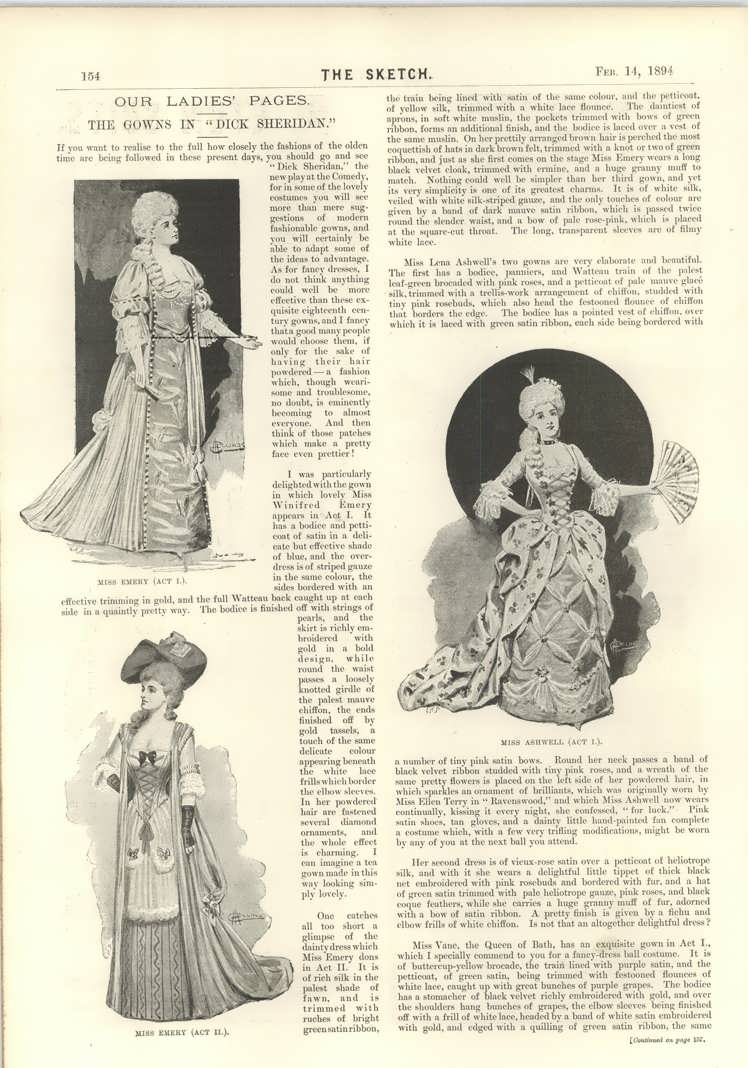 |
|
|
Punch (17 February, 1894 - p.81)
SHERIDAN BU-CANONISED!
WHAT fatal dementia seized upon BOB BUCHANAN that he should have written a play on Dick Sheridan? Had he been as familiar with his subject as he has been with the christian name of his unfortunate hero he might possibly have taken more time and more thought, if either would have assisted him, before giving (for a consideration) this “new and original comedy” to a mighty censorious world. However, ’tis done, and there’s an end on ’t, or soon will be, but in the meantime let me congratulate the principal actors in this series of scenes from the life of Dick Sheridan, arranged by BOB BUCHANAN, not on the parts they play, but the way in which they play them.
Physical resemblance between RICHARD BRINSLEY SHERIDAN, as known to us by his portraits, and Mr. H. B. IRVING there is none; but, physically and mentally, he is as like BOB BUCHANAN as Mr. BOB BUCHANAN has allowed him to be. What an unconscionable dull dog, though as bit of a “rantin’ roarin’ boy,” too, on occasion, in this
Bu-canonised Dick Sheridan! Like the saturnine CHARLES THE SECOND of merry memory, this Dick Sheridan often says a foolish thing (and a very prosaic one too) and never does a wise one. However, young Mr. IRVING, considering that after all he is little more than a beginner, plays this part (such as it is, and thank BUCHANAN for it) so well that we may look forward to his successful appearance as Joseph Surface and then as Hamlet. Il ira loin.
|
|
|
|
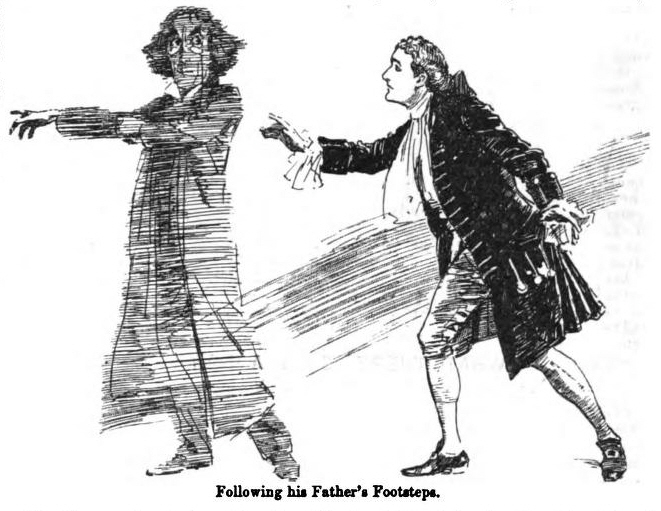 |
|
|
|
The eccentric part of Dr. Jonathan O’Leary, a kind of Dr. O’Toole, the Irish tutor, with a dash of that very old- fashioned pedagogue Dr. Pangloss, is made the most of by Mr. BRANDON THOMAS, who indeed adds to the natural gifts of the individual by throwing in here and there just so much flavour of Scotch accent as suggests the observant and retentive traveller. With sprightly Miss PATTIE BROWNE as Mrs. Lappet the lady’s maid (a name fashioned on the good old farce principle of styling a tailor Mr. Button, a butcher Mr. Chops, and so forth, a plan adapted to the meanest capacity of theatre-going intelligence), Dr. O’Leary Thomas is responsible for the conventional low comic relief, a kind of forlorn hope in such cases, essential to most pieces, and more especially to Adelphi Dramas, to which class of entertainment this play, with its turgid sentiment, its scowling villain, its aforesaid low comedy “relief” of servant and maid, its stern parent, its secret marriage, its heroine in distress, and its duel in the room by candlelight, evidently aspired to belong.
Had BOB taken more thought over DICK, he might perhaps, with the aid of a collaborator such as was the late Mr. HENRY PETTITT, and by eliminating Sheridan, and introducing a railway accident or a battle-scene, have realised by it a considerable fortune at the Adelphi; and then he could have retired and amused himself, if nobody else, by writing comedies for nowhere in particular on the model of this Dick Sheridan.
Mr. CYRIL MAUDE is always marvellous in his making up, and this latest travestie of his as Lord Dazzleton (another farce-name! So good!) is quite equal to anything he has previously done. The part is as admirably played as the picture is painted by this artist from the sketch given him by BOB, the author.
With excellent effect does Mr. LEWIS WALLER represent the Adelphi-Drama-villain, Captain Matthews, who is not at all the Captain MATTHEWS of SHERIDAN’S true story; but as “R. B.” (not “RICHARD BRINSLEY” without the SHERIDAN, but “ROBERT BUCHANAN”) explains in a foot-note to the bill, “this Comedy has no pretensions to historical accuracy in matters of detail,” we must be satisfied with the goods the gods provide, and no more question details of this historical unhistorical pastoral-comico-tragical comedy, than we would inquire too curiously into the excellence of the raw property materials for Dr. O’Leary’s Irish stew.
Mr. SYDNEY BROUGH has a character closely resembling that “horsey” one of the Tom-and-Jerry period in Sowing the Wind, then played by Mr. EDMUND MAURICE, who, now, as representing the “stern pairent who has but one daughter an unkimmon fine young gal,” is much “exercised” in spirit, and has to observe, in the course of other sapient remarks, that “he has some difficulty in making up his mind,” which, by the way, can be nothing to the difficulty he must have experienced in making up his face, for “a more complete change of front” (as the old lady said who didn’t wear her own hair, and had to alter from brown to grey) it is rare to see, even in these days of ultra-perfection in the art of “making up.”
Then there is Mr. JOHN BYRON, who very carefully plays Abednego, in a tediously witless scene (quite representative of “R. B.” without the “SHERIDAN”), and Mr. WILL DENNIS, who does his utmost to realise, to himself at least, even if others remain unconvinced, that he is a living representative of DAVID GARRICK, and, for the matter of that, so he is, for does he not represent David Garrick “as he is wrote” by Mr. ROBERT BUCHANAN, whose work, by his own admission, “has no pretensions to historical accuracy in matters of detail”?
It is by Miss WINIFRED EMERY, as Miss Elizabeth Linley, or rather as herself playing the heroine, whether the name be Linley or any other, that the piece has to stand, even if it stand totteringly. She is strong enough to support the poor thing; and she may impart to it some of her own vitality. But what is there for her to do? Where is there scope for the actress to act? There is much vapouring, and much appealing, as it were, to the SHERIDAN tradition in order to enlist the sympathies of the public for Mr. BUCHANAN’S namby-pamby heroine? It seems to me a thankless part, which only the auctoritas of the actress can make occasionally interesting. Is there in it one really strong and telling situation dependent on the heroine alone?
By the way, one word with Mr. WALTER HANN, whose scenery is admirable, and with Mr. HASTINGS the Stage Manager. Are Sheridan’s lodgings next door to Mr. Linley’s house? Why do I ask? Because when the curtains of the window in Miss Linley’s boudoir (Act III.) are not quite closed, the same view is distinctly visible as is seen from the window (Act II.) of Sheridan’s lodgings in London. Mr. WALTER HANN will go for a change to Hastings.
Mr. ROBERT BUCHANAN did exceptionally well with Tom Jones and Joseph (why didn’t he call him “JOE”?) Andrews at the Vaudeville. But that was “once upon a time,” and, however well he succeeded with Tom and Joe, BOB has shown that, to use the slang of a year or so ago, now happily almost out of date, he is not “up to Dick.”
THE B IN BOX.
___
The Illustrated Sporting and Dramatic News (17 February, 1894 - p.14)
DRESS AT THE COMEDY.
|
|
|
|
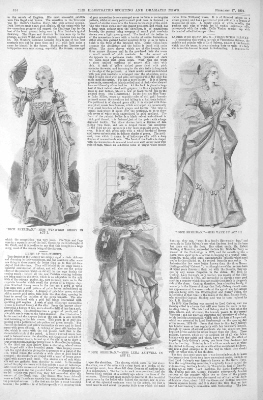 |
|
|
|
Ally Sloper’s Half Holiday (24 February, 1894 - p.6)
|
|
 |
|
|
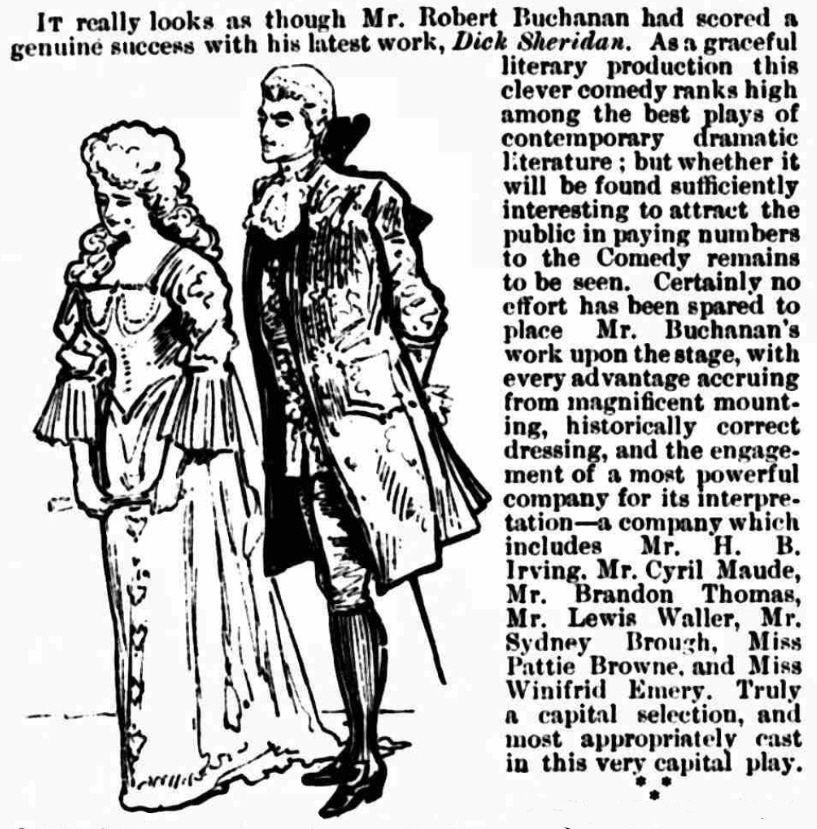 |
 |
 |
|
[Front page of The Sketch (28 February, 1894).]
The Theatre (1 March, 1894)
“DICK SHERIDAN.”
A new and original Comedy in four acts, by ROBERT BUCHANAN.
First produced at the Comedy Theatre, on Saturday evening, 3rd February, 1894.
|
 |
 |
|
One may question it as history and deny it as “old comedy;” but there is no disputing that in “Dick Sheridan” Mr. Buchanan has conceived and Mr. Carr has artistically presented a whole gallery of very pretty, lively, entertaining pictures. The first few of the series plunge us into the vortex of the fashion and folly and frivolity of Bath. At the Assembly Rooms, gallants old and young, bewigged, beruffled, and berapiered, elegantly lounge and lazily quiz, flirt, and simper, and lightly tread the gavotte and the minuet. They form a page from Austin Dobson, translated into flesh and blood. And if the ladies be not in truth his “Ladies of St. James’s,” with the crowd they would pass very well for modish members of that more select assemblage.
These pictures of the first act supply new illustrations of the old story, that the course of true love never did run smooth. Suitors three are there for the hand of the lovely Miss Linley, and Sheridan the spendthrift being the man of her choice, his suit alone is frowned on by her portly parent, a gentleman of overhanging eyebrows and Dr. Johnsonian frame. But frown as he may Miss Linley will have none of his choice, the antique fop Lord Dazzleton, nor of the dashing Captain Matthews. Title and purse cannot lend charm to the withered and wizened old peer, nor can the handsome face and passionate fervour of his younger rival blind her to the Captain’s sinister look. But since the father remains obdurate, it behoves the daughter to be compliant, and the treacherous Captain, having provided a chaise in anticipation of his being chosen as her escort to France, in her flight from her father and her home, Sheridan and she take it and elope.
Then come pictures of the youthful author’s struggles for a hearing and for bread. His marriage with Miss Linley is unknown. She has returned to her father’s house, and awaits her husband’s success before publishing the truth. And Sheridan in his garret, devotedly tended by an old Irish tutor, starves and despairs. Till one day, Garrick, the great David Garrick, walks in with the news that “The Rivals” is a work of genius, and that he will do his utmost to get it produced at Drury Lane. Garrick, however, is a clumsy muddler as well as a very unauthoritative and unexpectedly gauche and nervous person. To enjoy a pointless little joke of his own, he has brought with him Sheridan’s worsted rival, Dazzleton, whose influence at the Lane is paramount, and who no sooner learns the identity of the author than he vows undying vengeance for the trick at Bath. But if Drury Lane won’t have the comedy Covent Garden will, and the prettiest picture of all is of Miss Linley in her boudoir on the night of its production, waiting for news of success.
Her heart and mind are in the play-house. To her faithful little maid she can talk only of that and of him. Distractedly she paces between the moonlit window and the ruddy glowing hearth, her lovely face pallid with excitement, her slender form quivering in an agony of suspense. It must, it must be a triumph, for has she not, with a wife’s eloquence and a woman’s tears, won over the all-powerful enemy, Lord Dazzleton himself, and has he not, with a richly-gloved hand upon his battered but kindly old heart, vowed that Dick Sheridan shall be proclaimed the genius that he is? Yes, it must be a triumph. Her love transports her to the scene, and she sees and hears it all. The flashes of wit; the answering ripples of laughter, swelling to roars of delight; the resounding cheers; that great jubilant shout which stamps a play with success; the pale face of her hero smiling his gratitude before rushing to clasp his darling Betty to his heart, and tell their glad secret to the world. She sees it all, and her heart is aflame with pride and love, and—the door opens, and on the threshold, dimly seen in the deep shadow, stands her hero, humbled and broken. No need to tell the story. Failure is written upon every feature. Captain Matthews has won. To his malignity the first-night fiasco is due, and the lover’s last hope has gone. But out of evil sometimes cometh good. The Captain presses his persecution too far. Bringing Mr. Linley into his child’s room to reveal her in her lover’s arms, he draws out the crushing confession that the two shameless ones are man and wife, and the villain’s trump card is taken.
What remains? Only the unquestioned triumph of “The Rivals” on its second performance, and the famous duel. Mr. Buchanan would be no playwright were he to neglect such a chance as history affords him of a thrilling fight between Sheridan and the Captain, and the fight we duly enjoy. It is not fought with the tigerish ferocity described by the historians. The rapiers do not snap as in “The Corsican Brothers,” and we are denied the thrill of a combat between men jabbing at one another with splinters of steel, in the beast-like spirit of Mr. Kipling’s barbarians, Torpenhow and Dick. Mr. Buchanan has tempered the fight to his shorn hero. But enough remains for pictorial purposes, and this picture of the ill-lit garret, and the white-faced men in flickering candle-light, exchanging deadly thrusts with glittering steel, is of a kind to rank high in popular esteem.
The worst and best are said of the play in saying that it is full of pictures. Characters, of course, are but lightly touched in. There is no detail, no profundity, anywhere. Lord Dazzleton, the showiest of the set, is really two gentlemen at once—separated by a gulf. For two acts and a bit he is all fop and heartlessness, for the rest all sentiment. But Mr. Cyril Maude makes a noble jump when the chasm is reached, and with the cleverest work he has ever done lands safely on the other side. Clever, very clever, all the way through, for just one moment, a moment of sincerity, regret, and humiliation, he is a great artist. Mr. Buchanan’s Sheridan is a woeful disappointment. Either he pictures him—in his own immortal phrase—“a dull young man of saturnine proclivities”—or he is misrepresented by the actor. Sheridan was all spirit and joke and fire—the life of the rout and of the tavern. He loved a song and a glass. And was, I suggest, just such a sparkish fellow as Mr. Charles Wyndham could have shown us a dozen years ago—could show us perhaps to-day. Whereas this Dick of the Comedy is moony, morbid, almost morose. He is dull and depressing, save when outwitting an Old Jew of less philanthropic principle than Mr. Hare’s. But if the conception be faulty, there is real promise in the execution. Mr. H. B. Irving, though prone to an excess of romantic fervour, plays with genuine feeling, and in his comedy scene is curiously suggestive of his father in method and in charm.
Miss Emery’s delicate hand finds a perfect medium in Miss Linley. Full of exquisite feeling, all that she does, says, and looks—and particularly looks, for a lovelier vision the stage never beheld—is quite enchanting, and exercises all the old and irresistible fascination of Rosamund Athelstane. Nor is the tale told yet. Mr. Brandon Thomas as an eighteenth- century Jaikes, a self-appointed body-servant with just a smattering of the classics—“O’Learyus sum, non Garrickus,” is his salutation of the great little Davy—is of inestimable value in lightening dull scenes; while the pretty impulsive girlishness of Miss Lena Ashwell, Mr. Sydney Brough’s manliness and nice conduct of a ’kerchief, hat, and sword, in a part all too slight and seldom seen, a meaning study of a knowing lady’s maid by Miss Pattie Browne—Miss Lottie Venne’s legitimate successor, and a very grim and powerful performance, finely restrained and marked by tragic passion, by Mr. Lewis Waller, the ideal Captain Matthews, are notable features of a production in which one can hardly place a finger on a weak spot. In “Dick Sheridan,” the author of “The Charlatan” has not done his best, but what is lacking in his work is more than made amends for by Mr. Carr, who has set upon the stage a dozen Orchardsons and a score of Marcus Stones, any one of which amply repays such as care for exquisite colouring and grace, and the quaint charm and dainty elegance of an artificial age.
___
Dick Sheridan was also given the spoof treatment in the March, 1894 issue of The Theatre. This ‘Condensed’ version is available below:
Condensed Dramas - Dick Sheridan
___
The Sheffield Evening Telegraph and Star (15 March, 1894 - p.2)
Mr. Robert Buchanan undertook the task of presenting Sheridan on the stage, and an uninteresting figure he made of the man we have ever been accustomed to regard as the soul of wit. It is facetiously announced than an interesting first night will be the production of “Bob Buchanan” by Richard Brinsley Sheridan. “The attempt to represent the famous Robert Buchanan upon the stage, with all that brilliance and sparkling wit with which his name is associated, is a bold undertaking even for Mr. Sheridan to essay; and we are not surprised therefore to hear that Mr. Sheridan has lightened his task by boldly declaring that he believes that really Robert Buchanan was a dull and ordinary person, and by representing him as such.” Possibly Mr. Buchanan is too much of a Scotchman to fully appreciate the satire.
___
The Era (24 March, 1894 - p.10)
IT is almost a question whether the compliment just paid by Lord Dufferin to our native drama is not neutralised by the display of ignorance it has called forth. Lord Dufferin took leave of absence from Paris mainly or entirely that he might see Mr Robert Buchanan’s play of Dick Sheridan. His interest in that work has been accounted for very correctly by the fact that he is Sheridan’s grandson, but when a leading daily paper states that his lordship’s mother was “one of the daughters of that poet and actor” we can but meet the statement with a blank denial. Sheridan was a very brilliant personage, but his warmest admirer could not call him a poet, and there is no record of his appearance as Charles Surface—except off the stage.
|
 |
 |
|
 |
|
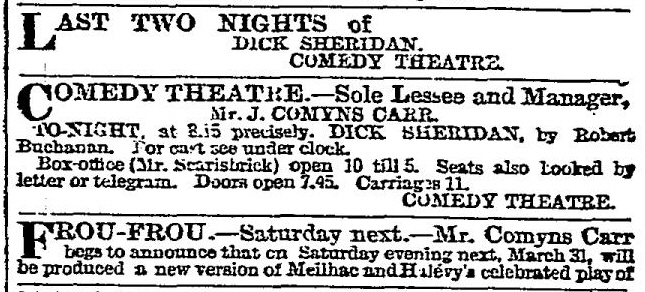 |
|
|
|
[Advert for the last nights of Dick Sheridan at the Comedy Theatre from The Times (29 March, 1894 - p.6).]
The Daily News (23 April, 1894 - p.6)
Messrs. Arthur Bourne and Gilbert Tate have, we understand, secured the provincial rights of “Dick Sheridan,” by Mr. Robert Buchanan, from the Comedy Theatre. Their first tour will commence early in the autumn at the Theatre Royal, Bath.
|
 |
|
|
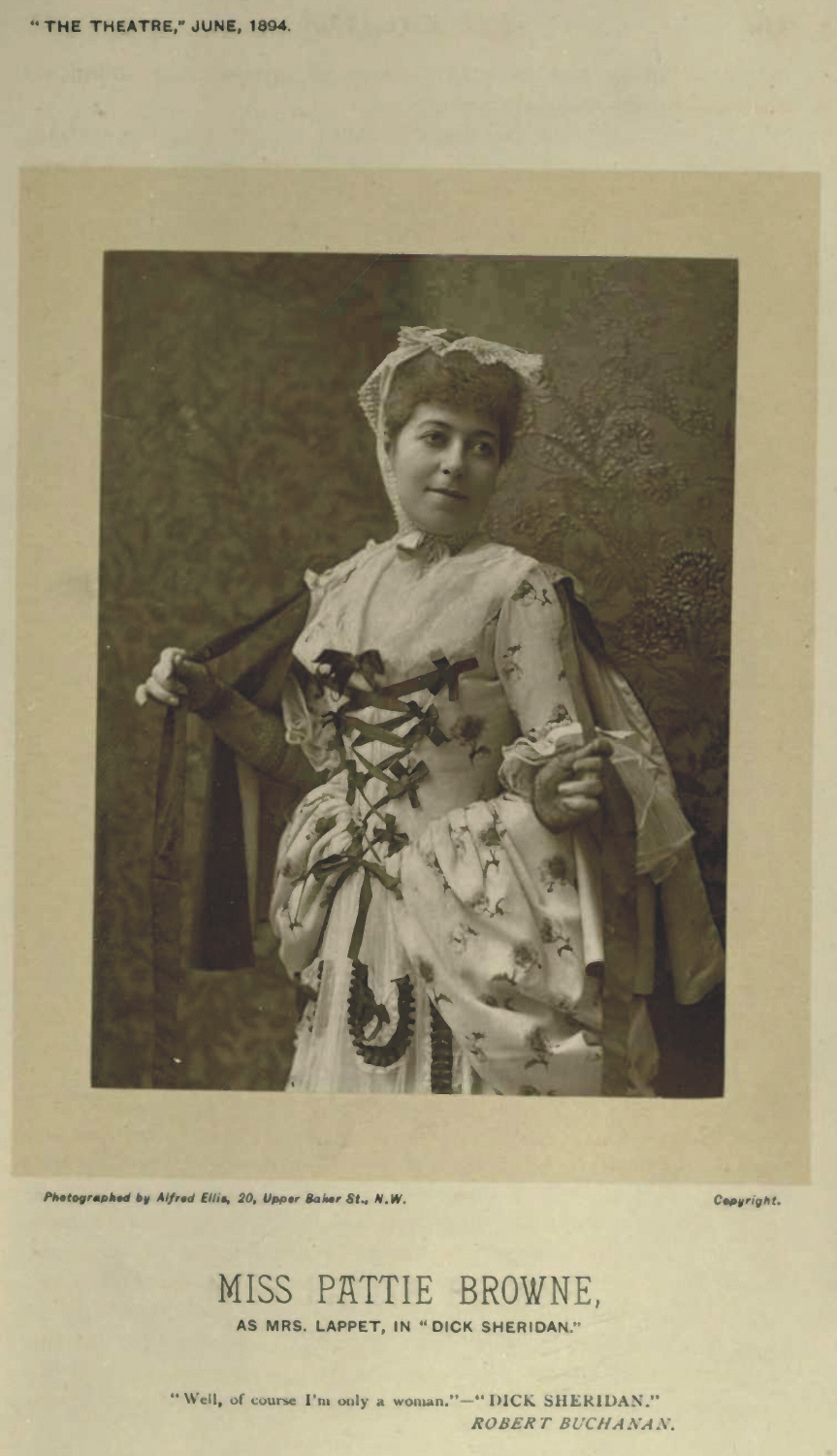 |
 |
 |
 |
 |
 |
|
 |
 |
 |
 |
|
[From The Theatre (June, 1894).]
The Stage (23 August, 1894 - p.5)
BATH—ROYAL (Lessee, Mr. William Lewis; Acting-Manager, Mr. W. D. Hawtree.)—On Monday, Mr. Robert Buchanan’s Dick Sheridan made its début in the provinces, appropriately enough opening at Bath, where the first scene is laid. The details of the Sheridan-Linley love episode were followed with the greatest interest. This became more and more pronounced as the play wore on, ensuring the performers a hearty round of applause at the close. Mr. George H. Harker makes a manly Sheridan, and is especially good with Miss Dora de Winton as Elizabeth Linley, when he comes to announce to her the failure of his play. Miss de Winton acts in a natural and unconstrained manner, making the utmost of her somewhat trying part. As O’Leary Mr. Wm. Bonney is capital, He seems cut out for the part, and his droll acting greatly contributes to the success of the piece. Mr. Henry Furnival thoroughly looks Lord Dazzleton. The exaggerated importance of the old coxcomb is simulated to a laughable degree, and his bewildered sensations when his condescending addresses are rejected by Miss Linley, Mr. Furnival seems to have realised to a nicety. Mr. Ernest Owttrim as Capt. Matthews came in for a few hisses now and then on Monday, and doubtless he would have had the satisfaction of a few more were it not that he seems hardly cut out to play the villain. His features seem scarcely reconcilable with the hardened rascality of the Captain. He has, however, studied the part well, and his acting leaves little to be desired. The ladies of fashion, Lady Miller (called “the Queen of Bath”), Lady Pamela Stirrup and Lady Shuttleworth, are respectively undertaken with credit by Miss Louise Russell, Miss Eleanor May, and Miss Jeannie Dempster. Mr. Charles Dudley gives a clever study of Abednego, the money lender, and Miss Annie Montelli certainly scores as Miss Linley’s maid. She sings a very taking old-fashioned air, which finds great favour with the audience. Mr. Leonard Robson as Sir Henry Chase, Mr. Louis Karpe as Mr. Linley, and Mr. J. Cooke Beresford as David Garrick all contribute to the success of the piece. A special word should be said for Mr. J. B. Cooke as the suave Master of Ceremonies at the Assembly Rooms. There is no incapable performer, and the minor parts are satisfactorily undertaken by Mr. Alfred Gray, Mr. John Walker, Mr. Gordon Doone, Miss Gertrude Lawrence, and Miss Ethel Garside. It should be mentioned that the handsome scene representing the Assembly Rooms was specially painted by Mr. W. D. Hobbs.
___
Northern Echo (18 September, 1894)
THE DRAMA AND THE STAGE.
_____
“DICK SHERIDAN” IN DARLINGTON.
A gratifying reception was accorded Messrs Bearne & Tate’s company in “Dick Sheridan” at the Darlington Theatre Royal on Monday night. The comedy is by Mr Robert Buchanan, and is in four acts, the first of which takes place in Bath and the others in London. The story runs thus: A penniless young man, handsome, Irish, reckless, with brains in his head and the “gift o’ the brogue,” attracts the attention and admiration of the loveliest woman of her time. She is the only daughter of a musician of Bath, but peers and commoners, rich and poor, are at her feet. Dick Sheridan is her fancy. An old dodderer, one Walter Long, of Wiltshire, settles £3,000 upon her when she refuses him. A profligate Captain Matthews, posing as her father’s friend, designs to seduce her. This fires the romantic enthusiasm of Irish Dick Sheridan, for the Irish, men and women alike, have special purity in their nature. Dick Sheridan, half in love, half in a religious frenzy, desires to shield the lamb from the wolf. He elopes with her, takes her to France, treats her platonically, marries her in secret to preserve her good name and honour, deposits her in a convent, sends her father to fetch her back, thrashes her would-be seducer not once but twice, is punctilious and ridiculous on questions of honour, makes her his wife in public as he had done before in private, and is so proud of his prize that, though penniless, he forbids his wife to sing in public any more, and guards her as the apple of his eye. It may be added that the piece affords superb illustrations of the characteristics of the times. The title rôle is portrayed with great ability by Mr George Harker, an old Darlington favourite; Miss Dora de Winton represents Miss Linley, the heroine, in a charmingly artistic manner; the part of the senile old beau Lord Dazzleton is amusingly taken by Mr Henry Furnival; Miss Eleanor May as Lady Eleanor Stirrup gives a delightful picture of the fashionable lady of the Sheridan period, and Miss Louise Russell makes a pleasing representative of “the Queen of Bath,” Lady Russell. Equally satisfactory are Mr William Bonney as Dr. Jonathan O’Leary (Sheridan’s servant-friend), Mr J. Cooke Beresford as David Garrick, Mr Ernest Owltrun as Captain Matthews, and Mr Gordon Doone as Sir Harry Chase.
___
The Belfast News-Letter (12 March, 1895)
THE WEEK’S AMUSEMENTS.
_____
THEATRE ROYAL.
_____
“DICK SHERIDAN.”
In selecting “Dick Sheridan” as the title and subject of a play, Mr. Robert Buchanan chose a name to conjure with. The drama which was put upon the boards of the Theatre Royal last night by Arthur Bearne and Gilbert Tate’s Company is founded on an incident connected with the love affairs of Richard Brinsley Sheridan, and professes to give an insight into the life of that great dramatist, while struggling through fears and hopes, into fame and fortune. But, although the name is one to conjure with, a great deal must also depend on the conjuring, and the dramatic element in this production cannot be pronounced particularly strong. One feels that a finer fabric might have been woven out of such materials, if only in justice to Sheridan. But on the whole, the play is a fairly good one, and it is not without its interesting and sensational situations. It would be worth going to see if only for the reason that it carries us back to the time of Sheridan, and gives us a glimpse into life as it went on in these days. It is a picturesque period that would please the artistic eye, different from the prose of this business century, giving scope for the display of costume, in the one case as in the other, the men dressing as gaily and charmingly as the women did. In the first act, which carries the spectators into the Assembly Rooms at Bath, the graceful and courtly minuet is given, and the performance elicited applause. Much of the interest must attach to the reflection of Sheridan himself, and we have him here in his lodgings in London, writing his plays. and receiving a visit from the immortal Garrick. But however excellent the soliloquisings may be thought, one is sometimes led to consider whether we have not more of the playwright in them than of Sheridan. To know Sheridan, after all, one must go to his works, as in the case of any author. That, however, may be passed by, if the illusion is conveyed. The Richard Brinsley Sheridan of last night was Mr. Arthur Bearne, and he gave a very sympathetic rendering, full of dignity, securing the good graces of the audience. We have what may be termed an extraneous character in the person of Dr. Jonathan O’Leary, who should be appreciated on this side of the Irish Channel, and the pourtrayal that was given by Mr. W. E. Bonney, in its humorous and other aspects, was an acceptable one. As Miss Elizabeth Linley, Miss Lillian Loriard has necessarily a prominent part, but the personation was somewhat lacking in ease and naturalness, although not without its winsome side. Mr. Dudley Clinton made a respectable David Garrick. The rest of the dramatis personæ were as follows:—Lord Dazzleton, Mr. Henry Furnival; Captain Matthews, Mr. Ernest Owttrim; Sir Henry Chase, Mr. Frederick Knight; Mr. Linley, Mr. Walter Russell; Mr. Wade (master of ceremonies at Bath), Mr. J. Annandale; Captain Knight, Mr. H. Sinclair; Sir James Loder, Mr. E. Merton; Mr. Abednego (a money lender), Mr. R. Bedford; Servant, Mr. John Gaylard; Mr. Linley’s servant, Mr. Howard; Lady Miller (called “The Queen of Bath”), Miss Louise Russell; Lady Pamela Stirrup, Miss Lucy Wilson; Lady Shuttleworth, Miss L. Walker; Honourable Mrs. Elliott, Miss Lena Radcliffe; Miss Copeland, Miss Winifred Harley; Miss Beamish, Miss Ivy Broughton; and Mrs. Lappet, Miss Louie Tinsley. “Dick Sheridan” will be continued throughout the week.
___
The Oban Times (30 March, 1895 - p.2)
GREENOCK NOTES.
“DICK SHERIDAN,” A COMEDY BY MR ROBERT BUCHANAN.
Lovers of the British drama in Greenock who can appreciate native production have had throughout the whole of last week in the neat temple of the drama, West Blackhall Street, a rare comedy presented to them by the facile pen of the well-known Scottish litterateur, Mr Robert Buchanan. The accomplished dramatist worked out the plot of the piece from some of the many stirring incidents in the life of the celebrated author of “The Rivals,” “The Critic,” “The School for Scandal,” etc. Under the capable management of Messrs Arthur Hearne and Gilbert Tate, and their excellent company, the piece was produced with care, admirable taste, and splendid acting. In a very skillful manner, following up the quaint characteristics of “Dick Sheridan,” as he was so known in his day, and generally by many of his boon literary cronies, Mr Buchanan has produced a comedy in four acts of sparkling brilliancy and life-like situations. As a playwright Mr Buchanan stands in the front rank with his most favoured contemporaries, and his comedy of “Dick Sheridan” is certainly one more honour to his many literary triumphs.
___
Although I’ve not come across any later productions of Buchanan’s Dick Sheridan, I did find another production of Paul M. Potter’s American version, Sheridan, or The Maid of Bath. This took place at the Belasco Theatre in Los Angeles in June, 1905. The full programme is available here, but these are the relevant pages:
|
|
|
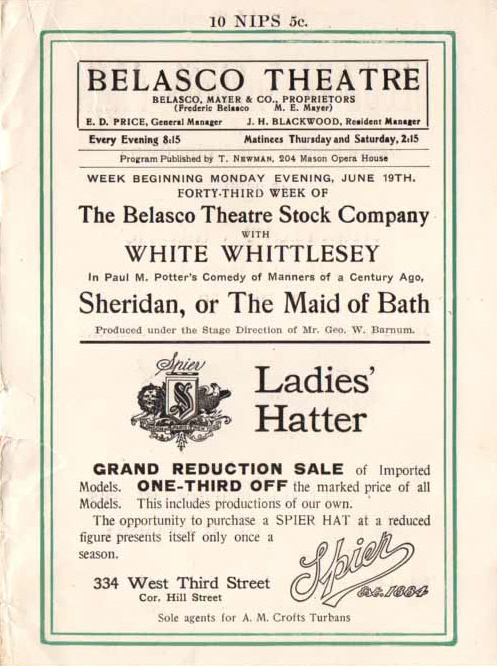 |
|
|
|
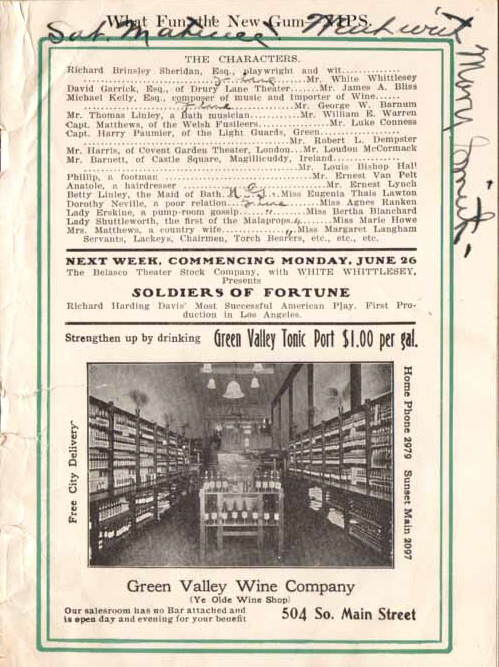 |
|
|
|
Further information about Paul M. Potter (who was actually born in Brighton) is provided by his entry in Who’s Who in Music and Drama edited by Dixie Hines and Harry Prescott Hanaford (New York: H. P. Hanaford, 1914):
|
|
|
|
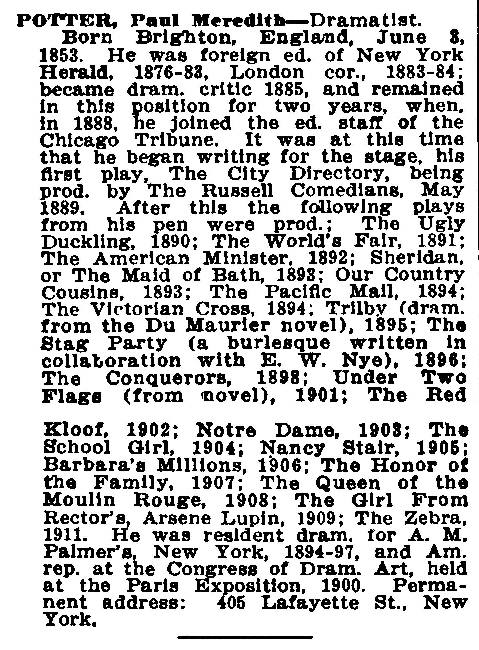 |
|
|
|
And here’s his obituary from The New York Times (8 March, 1921).
___
From Celebrities of the Stage edited by Boyle Lawrence (London: George Newnes, Ltd., 1899 - pp.6-7)
|
 |
|
|
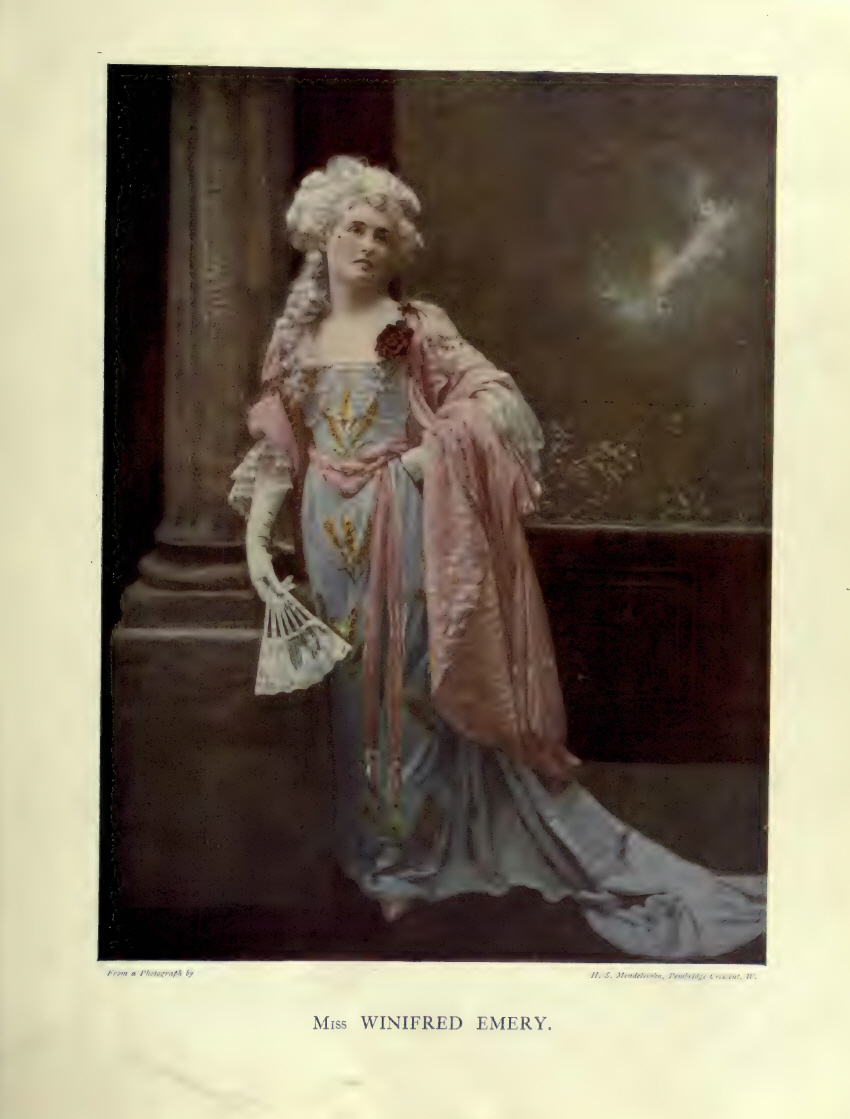 |
 |
|
|
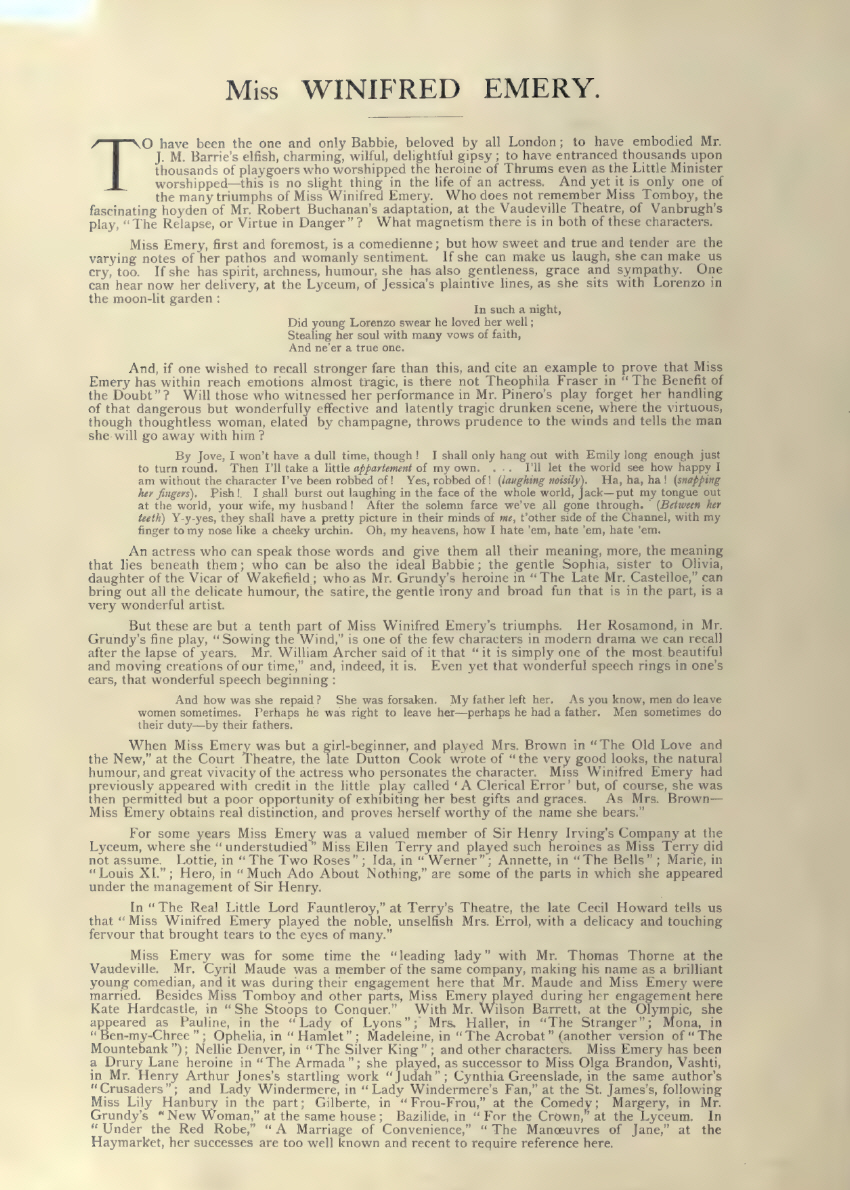 |
|

